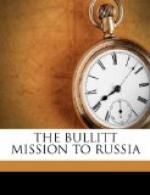Very respectfully, yours,
WILLIAM C. BULLITT.
Senator NEW. Otherwise you had no fault to find with it?
Mr. BULLITT. Yes. The morning after Col. House had told me he wished to submit this proposition to his international law experts, I came as usual to his office about 9.40, and Mr. Auchincloss was on his way to the President with his proposal, the Auchincloss-Miller proposal, as Col. House’s proposal. But I got that stopped. I went in to Col. House, and Col. House told Mr. Auchincloss not to take it up to the President, and asked me if I could doctor up the reply of Mr. Auchincloss and Mr. Miller to the Nansen letter so that it might possibly be acceptable to the Soviet Government. I thereupon rewrote the Auchincloss-Miller letter, but I was forced to stick very closely to the text. I was told that I could cut things out if I wished to, but to stick very closely to the text, which I did. I drew this redraft of their letter, under protest at the whole business. My redraft of their letter was finally the basis of the reply of the four to Nansen. I have both these documents here, my reply—and the four took that reply—and with the changes——
The CHAIRMAN. What four—the successors of the ten?
Mr. BULLITT. The successors of the 10, sir, took the reply------
The CHAIRMAN. Who were the four at that moment?
Mr. BULLITT. M. Orlando, Mr. Lloyd George, M. Clemenceau, and the President. This extremely mild proposition, which really had almost no chance of life, was, you will see, in no sense a reply to these proposals of the Soviet Government. This is my attempt to doctor up the Auchincloss-Miller proposition. In spite of every effort I could make to obtain definite action on it, the reply was made to me that this reply to the Nansen proposal would be a sufficient reply to that proposal of the Soviet Government. [Reading:]




